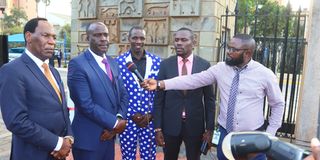Kisii leaders rally to save Embarambamba

National Assembly Majority Whip Silvanus Osoro speak to journalists while accompanied by Gusii-based gospel artiste Christopher Musioma, aka Embarambamba, the Music Copyright Society of Kenya (MCSK), CEO Dr Ezekiel Mutua, and lawyer Danstan Omari.
What you need to know:
- Leaders met and agreed that the controversy surrounding his songs be resolved through Alternative Dispute Resolution.
- This serves as a reprieve to the artiste who had been ordered to pay a whopping Sh6.4 million in film and licensing fees and to delete some songs from his YouTube channel.
Barely hours after lawyer Danstan Omari came to the defense of Gusii-based gospel artiste Christopher Musioma, aka Embarambamba, leaders met and agreed that the controversy surrounding his songs be resolved through Alternative Dispute Resolution.
This serves as a reprieve to the artiste who had been ordered to pay a whopping Sh6.4 million in film and licensing fees and to delete some songs from his YouTube channel.
South Mugirango MP and National Assembly Majority Whip Silvanus Osoro, the Music Copyright Society of Kenya (MCSK) CEO Dr Ezekiel Mutua, the Acting CEO of the Kenya Film Classifications Board Nelly Muluka and Mr Omari, amongst others, met on Wednesday to discuss the controversy surrounding Embarambamba.
"We are going back to ADR. We had serious discussions with Mr Mutua, MP Osoro and Ms Muluka and we have agreed that he (Embarambamba) will continue with his work," Mr Omari told Nation on the phone.
According to the advocate, the controversy surrounding Embarambamba was becoming emotive since it had taken "a tribal angle".
"The Kisiis were angry that others did it and nobody has ever been banned but Embarambamba. Even telling the artist to pay Sh6.4 million... from where would he get it?" posed Omari.
On his social Facebook page, Osoro announced that Embarambamba had committed to "clean content going forward as a different trajectory is being pursued towards resolving the demand of Sh6.4 million by the KFCB".
"The temporary ban on counter creation is lifted and he is now free to engage within acceptable limits," Osoro's statement read further.
Dr Mutua, also on Facebook, averred that "everyone deserves a second chance".
According to Dr Mutua, Embarambamba needs help to become a better artist.
"...we have embarked on the journey to help Embarambamba reform. I hope to God that this guy's energy can be turned into something constructive," said Dr Mutua.
Earlier, Omari wrote a letter to Ms Muluka, accusing her of intending to kill Embarambamba's music career by branding his songs as "indecent."
Omari defended Embarambamba saying, "he is a minister of the word of God whose creative works have all through been done to minister the gospel and recruit souls for Christ".
He advanced that Embarambamba is deeply disturbed by the "callousness" of KFCB's demand of Sh6.4 million and that the singer, just like other musicians in Kenya, have been earning meagre royalties from the Music Copyright Society of Kenya (MCSK) cannot afford the millions demanded.
"Our clients like other musicians in Kenya receive meagre royalties from MCSK, a fact that is well within your knowledge. As such, our client is lost on where he should obtain the millions you demand," read Mr Omari's letter.
The advocate blamed KFCB and other state organs for frustrating the growth of Embarambamba as a musician, plus his God-given abilities, yet they are supposed to support his talent.
"It is shocking and bewildering that instead of celebrating our client's creativity and ingenious ideas of ministry, you have resolved to discourage him and intimidate him by making very scandalous and unmerited demands," Omari said.
He added that it is ingenious of Embarambamba to have created some of the contentious songs, like the one titled 'Niko Uchi'.
"... 'Niko Uchi' forms part of his genius creation aimed at reaching the deaf who cannot hear his message but are nonetheless able to understand the message from pictures and scenes of the song," the letter stated.
On February 28, Ms Muluka wrote to Embarabamba about his songs videos on YouTube.
"Your over 1,000 videos on YouTube and the one titled 'Niko Uchi' among others, have been criticised for being blasphemous and contain offensive and vulgar language, thus eliciting sharp reaction and outcry from the public," Ms Muluka's letter said.
KFCB demanded that Embarambamba ceases from circulating and broadcasting his music videos.
He was instructed to comply with the requirements of the law by obtaining a film license and classification before exhibiting to the public.
But Mr Omari lambasted Ms Muluka for lacking precision and being discriminatory and hostile to Embarambamba.
"While you make reference to the over 1000 videos in our client's YouTube channel, you have failed to particulise the videos in issue."
Omari faulted KFCB for failing to give his client a fair administrative action by failing to invite him to the board to clarify some issues leading to the "administrative error."
"We note that your impugned decision is discriminative and hostile to our client’s rights to equality before the law," he wrote.
"It is highly suspected that the instant demand is influenced by your bias and contempt towards our client and not any other lawful purpose," Omari claimed.
Some of his songs are titled ‘Nimebeba Nyundo’, ‘Nataka Nikuingize Ndani Yesu', 'Imesimama', 'Inyigwete Ndine', 'Mama Nariegwa', 'Yasoire Bono Samira' and 'Napenda Mbele - Sipendi Nyuma'.
The Board claimed that Embarambamba had contravened Sections 4(Part II) and 12 of the Cap 222 governing the creation, broadcasting, possession, distribution and exhibition of audio-visual content in Kenya.
"It is through my songs that I feed my parents and send my children to school. I have no other job," Embarambamba said.





